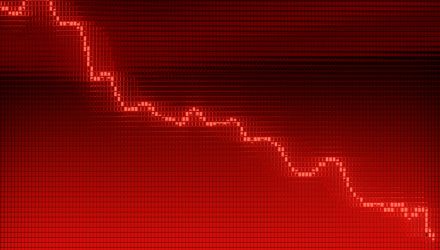U.S. markets and stock ETFs declined Wednesday after a soft patch in private-sector jobs weighed on sentiment and fueled fears that the economy is making a turn for the worse.
On Wednesday, the SPDR Dow Jones Industrial Average ETF (NYSEArca: DIA) fell 2.1% and the SPDR S&P 500 ETF (NYSEArca: SPY) dropped 2.0%.
As of 2 pm ET Wednesday, the Dow was down 525 points (1.98%), the S&P 500 down 57 points (1.95%) and Nasdaq down 146 points (1.85%).
According to the ADP National Employment Report, the protracted trade war between the U.S. and China may have spilled over to the domestic labor market as U.S. private employers hired fewer-than-expected workers in September, Reuters reports.
“People have been anticipating a bear market for years and they are very anxious and so any number like the ADP number is amplified in the volatility on the downside,” Tom Plumb, chief investment officer at Plumb Funds, told Reuters.
Risk-off Mood Being Fueled
The private payrolls report, which came out ahead of the Labor Department’s more comprehensive jobs report due Friday, followed a day after data revealed U.S. factory activity contracted to its lowest level in over a decade, further fueling the risk-off mood that plagued the start of the fourth quarter.
“It feels like one thing after another the last couple of days,” David Laffertry, chief market strategist at Natixis, told the Wall Street Journal. While Wednesday’s jobs report from ADP was soft rather than outright weak, “within the context of other bad macro data the last couple of days, it’s sort of piling on.”
Related: Why Gold is Shining Bright This Quarter
Political risk may have also played into Wednesday’s selling after presidential candidate Bernie Sanders canceled campaign appearances due to a health issue. Art Cashin, who runs the NYSE floor operations of UBS, argued that if Sanders dropped out, most of his support would go to Sen. Elizabeth Warren, whom has been a long-time critic of banks and Wall Street.
“The last 200 to 300 points may have been a Bernie factor,” Cashin said in a note.
For more information on the markets, visit our current affairs category.








